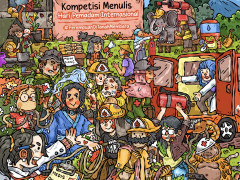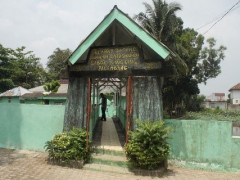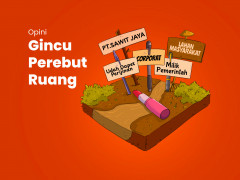Short Story Competition "Woman from Burning Land"
By Admin Pantau Gambut
The Harmful White

There are no more dense forests as habitats for various flora and fauna that are safe from excessive destruction and exploitation. What remains are solely wetlands, serving as avenues for the affluent to enhance their wealth. This is reflected in the existence of 3.3 million hectares of illegal oil palm plantations in forest areas. To exacerbate the situation, the government is attempting to grant amnesty to the companies owning these plantations through Articles 110A and 110B of the Omnibus Law on Job Creation. Amnesty is an effort to pardon companies that own illegal oil palm plantations in forest areas. In other words, plantations that were initially illegal are converted to legal status by fulfilling certain requirements and paying administrative fines.
This is completely unacceptable. The illegal palm plantations operate within forest areas categorized into three different zones: conservation forests, protected forests, and production forests. Among these zones, only production forests are permitted for commercial activities. According to Forestry Law No. 41 of 1999, commercialization within conservation forests is prohibited as they serve as habitats for highly diverse biodiversity, including protected flora and fauna. Similarly, the same restriction applies to protected forests, which function as water catchment areas and buffers for other regions—especially conservation areas.
According to reports from Greenpeace and The Treemap (2019), palm plantations are covering an area of more than 100 hectares spread across 49 conservation areas in Indonesia. Specifically, these plantations operate within National Parks, Wildlife Reserves, and even UNESCO sites. This poses a threat to various biodiversity and ecosystem sustainability within forest areas that have long been protected by law.
In addition, there are also 278 palm companies operating illegally within the Peat Hydrological Unit (PHU) area. This situation is intensified by 44 percent of them located within the protective peat ecosystem function. This indicates violations of Article 21 of Government Regulation No. 71 of 2014 regarding the Protection and Management of Peat Ecosystems, in conjunction with Government Regulation No. 57 of 2016, where commercial activities are prohibited in areas designated for protecting peat ecosystem functions. These areas play a vital role in the hydrological peat ecosystem, which is also home to various biodiversity.
Not only does this pose a threat to biodiversity, but it also increases the risk of forest and land fires. Based on a study conducted by Pantau Gambut regarding forest and land fires, it was found that 3 out of 10 companies in the PHU area eligible for an amnesty schemes were at a high risk of forest and land fires, while the remaining 7 out of 10 were at a medium risk level. In other words, all companies eligible for the amnesty schemes are vulnerable to fire. Instead of improving the peat ecosystem and preventing future forest and land fires incidents, the government chooses to pardon these companies.
This amnesty also incurs financial losses for the country. TuK INDONESIA analyzed Central Kalimantan's potential financial losses to the state by comparing the target tax revenues set with the actual achievements. Based on this analysis, there is a difference of approximately Rp4.6 Trillion between the potential revenue from the palm sector and the actual revenue from regional taxes across all sectors.
The local community can also fall victim to the presence of these illegal plantations due to the absence of a transparent and accountable consultation process by companies. A recent example is the shooting incident by police officers against residents of Bangkal Village in Seruyan Regency, Central Kalimantan in early October 2023. This issue stems from agrarian conflicts between the community and PT. Hamparan Masawit Bangun Persada (PT. HMBP). The absence of the consultation process indicates that the operating palm plantation does not have a Right to Cultivate. In these permits, companies should consult with the local community, prioritizing the principles of FPIC (Free, Prior, and Informed Consent). This entails the indigenous community's right to give or withhold consent regarding various matters affecting their land, territory, and rights.
The problem extends beyond this, companies with ISPO (Indonesia Sustainable Palm Oil) certificates are also found to operate illegally, such as PT. HMBP. This finding contradicts the primary goal of ISPO, which is to reduce greenhouse gas emissions and increase international market acceptance of Indonesian palm oil, as outlined in Articles 3(b) and 3(c) of Presidential Regulation No. 44 of 2020 regarding the Indonesian Sustainable Palm Oil Certification System. In other words, companies are merely engaging in greenwashing to comply with procedural requirements.
On the flip side, there's a noticeable contradiction within the palm oil granted amnesty policy. Despite the presence of criminal sanctions under the Environmental Protection and Forestry Law for violations related to plantation activities above forests without ministerial permits, the effectiveness of these regulations is compromised by the introduction of the Job Creation Law Articles 110a and 110b, which prioritize administrative penalties. Interestingly, the Environmental Protection and Forestry Law fails to adhere to the ultimum remedium principle – the notion that criminal law should be a last resort in law enforcement, with other legal avenues explored before resorting to criminal sanctions. Hence, criminal penalties against violators should ideally remain intact.
In addition, there are discrepancies between Article 110a of the Job Creation Law and its implementing regulation, Government Regulation No. 24 of 2021, regarding the timeframe for completion. This discrepancy will affect the clarity of norm implementation. Article 110a of the the Job Creation Law specifies that the deadline of November 2, 2023, is for fulfilling licensing requirements, whereas Article 19 of Government Regulation No. 24/2021 states that the three-year deadline from the enactment of the Job Creation Law No. 11/2020 is for submitting applications. This raises questions about the transparency of deadlines for companies to submit applications for resolving plantation licensing in forest areas
These contradictions have emerged as anomalies, serving as loopholes and mechanisms for pardoning both past and prospective transgressions. The ongoing execution process of forest and land fire verdicts will also be affected by the introduction of this policy. Ultimately, it is the environment and the community that bears the brunt of these consequences.
Observing the extraordinary impact of this government decision, Pantau Gambut strives to provide information about government amnesty more understandably. Under the title #WhiteMonsterHunt, Pantau Gambut presents a game that invites the public to play while understanding the intricacies of government amnesty. The choices made by players will determine the storyline in the White Monster Hunt. Join us in this hunt through the following link!



